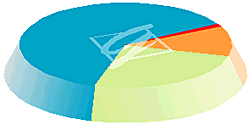| First Language As the data provided by the SLMP indicate, Galician is the first language of the majority of the population. |
|||||||||||||||||||||||||||||||||
Galician population first language | |||||||||||||||||||||||||||||||||
 | |||||||||||||||||||||||||||||||||
But on closer inspection, a breakdown of the results by age-groups reveals that Galician as the first language predominates in the +26 age-group, peaking in the +40 age-group. On the other hand, Spanish is the first language of the majority of the younger generations, with notable fluctuations depending upon their respective backrounds: the percentages for -25 year-old first-language Galician speakers interviewed rise for people coming from a rural, and more especially a 'periurban' background, which is defined as: 'population centres which are geographically distanced from the administrative centre within urban boroughs but which depend to a great extent on that administrative centre"
For Galicia as a whole, 11.4% of all bilingual-speakers generally tend to come from less rural areas, with the highest levels concentrated in the towns and cities. Turning now to the question of language switching, it is all but infrequent to find cases of people who have given up their first language. The reasons which give rise to this kind of switching vary considerably according to the age, sex and also according to the first language of the speaker involved, ie. first-language Spanish-speakers tend pick up the other language much earlier than do the first-language Spanish-speakers, with the driving force involved here being adaptation to their milieu. However, it would appear that schooling is the factor which causes language switching more often in the former group (21.9%) than in latter, where the percentages fall ten points. The home is the main means by which first-language Spanish-speakers pick up the Galician language. However, as things stand, there is a noticeable downwards trend for the transmission Galician within the home in favour of the school setting which is becoming an alternative means of acquiring Galician for the younger generations and in rural areas. |
|||||||||||||||||||||||||||||||||
Back to Galician today